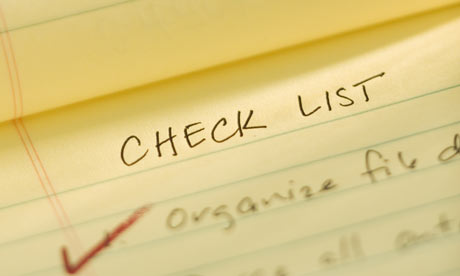
In grudging acknowledgment of the season, I'll start with an ingenious tip. If you're in charge of Christmas dinner, with all its interconnected tasks and challenges of timing – when to preheat the oven, whether to put the potatoes in before the parsnips – why not write down every action that needs doing, in order, then do them, checking them off as you go? Like I said: ingenious. Think of it as my gift to you.
I make no apology for returning here to the topic of lists: as Umberto Eco put it in a recent essay, "The list is the origin of culture… We like lists because we don't want to die." But as the list-obsessed Eco would surely appreciate, the checklist – a standardised, step-by-step list of the actions required to achieve some regular task – is a unique subspecies, distinct from the open-ended to-do list or the brainstormed list of ideas. And, boneheadedly simple as it sounds, the checklist harbours hidden powers: according to an important new book, it could be saving thousands of lives.
The Checklist Manifesto, by the journalist and medic Atul Gawande, takes as its starting point the astonishing things that happen when hospital doctors are required to tick off items on checklists as they carry out routine but critical procedures. In one trial, the rate of infections from intravenous drips fell from 11% of all patients to zero simply because staff were compelled to work through a checklist of no-brainer items, such as washing their hands. Many doctors grumbled: it was more paperwork, it wasted time and it insulted their professional judgment by implying that they needed reminding of stuff they'd learned in the first month of medical school. But it worked. A more recent study, which included UK hospitals, suggested that wider use of checklists might prevent a staggering 40% of deaths during treatment. Airline pilots, of course, already rely heavily on them, but Gawande suggests checklists might have impressive effects if adopted throughout business, governance and beyond.
Unlike in medicine and aviation, the potential uses of checklists in everyday life – a list for holiday packing, say, or for getting the kids out of the house every morning (there are hundreds of examples at checklists.com) – aren't usually matters of life and death. But they are similar in this respect: the idea of making a checklist is so stupidly obvious that it seems impossible it could have so vast an effect. As with the doctors, the suggestion that we use more checklists in our lives, advanced by numerous time management gurus, seems a veiled insult: are they suggesting that we're too stupid to rely on our instincts and expertise in the moment? But the truth is that all life, not just medicine, is increasingly complex; if highly trained intensive-care specialists can forget a crucial step, it's surely conceivable that anyone might.
Besides, the stepwise structure of checklists has the salutary effect of narrowing your focus to the next action. When it comes to large undertakings, dwelling on the big picture can be paralysing, and a distraction from the next step, which is the only one you can ever actually take. As they say, I'm told, at Alcoholics Anonymous, where they preach it as a survival strategy, all you have to remember is to "do the next right thing". Then the next, and the next, and the next.
oliver.burkeman@theguardian.com

